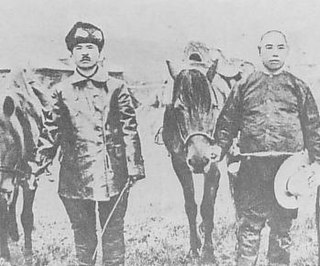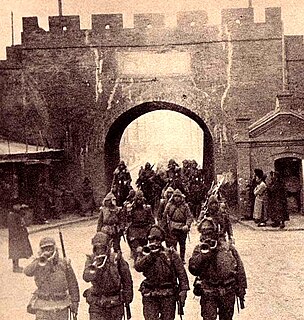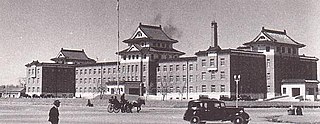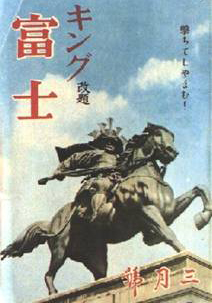Related Research Articles

Imperialism is a policy or ideology of extending the rule over peoples and other countries, for extending political and economic access, power and control, often through employing hard power, especially military force, but also soft power. While related to the concepts of colonialism and empire, imperialism is a distinct concept that can apply to other forms of expansion and many forms of government. Imperialism is simply a manifestation of the balance of power and is the process by which nations try to achieve a favorable change in the status quo. The purpose of imperialism is to decrease the strategic and political vulnerability of a nation.

Manchukuo, officially the State of Manchuria prior to 1934 and the Empire of Manchuria after 1934, was a puppet state of the Empire of Japan in Northeast China and Inner Mongolia from 1932 until 1945. It was founded in 1932 after the Japanese invasion of Manchuria, and in 1934 it became a constitutional monarchy. Under the de facto control of Japan, it had limited international recognition.

The Kwantung Leased Territory, was a leased territory of the Empire of Japan in the Liaodong Peninsula from 1905 to 1945.

In the context of the history of the 20th century, the interwar period was the period between the end of the First World War on 11 November 1918 and the beginning of the Second World War on 1 September 1939.
William Appleman "Bill" Williams was one of the 20th century's most prominent revisionist historians of American diplomacy. He achieved the height of his influence while on the faculty of the department of history at the University of Wisconsin–Madison and is considered to be the foremost member of the "Wisconsin School" of diplomatic history.

The Shōwa Steel Works was a Japanese government-sponsored steel mill that was one of the showpieces of the industrialization program for Manchukuo in the late 1930s.

The General Affairs State Council (国務院) was the official executive administrative branch of the government of the Japanese-controlled Empire of Great Manchuria from 1934–1945.

Masahiko Amakasu was an officer in the Imperial Japanese Army imprisoned for his involvement in the Amakasu Incident, the extrajudicial execution of anarchists after the 1923 Great Kantō earthquake, who later became head of the Manchukuo Film Association.

The Nakamura Incident refers to the extrajudicial killing of Imperial Japanese Army Captain Shintarō Nakamura and three others, on 27 June 1931 by Chinese soldiers in Manchuria.

The Japanese invasion of Manchuria began on 18 September 1931, when the Kwantung Army of the Empire of Japan invaded Manchuria immediately following the Mukden Incident. At war’s end in February of 1932, the Japanese established the puppet state of Manchukuo. Their occupation lasted until the success of the Soviet Union and Mongolia with the Manchurian Strategic Offensive Operation in mid-August of 1945.
The South Manchuria Railway Zone (南満州鉄道附属地, Minami Manshū Tetsudō Fuzoku-chi) (Hanyu Pinyin: Nán Mǎnzhōu Tiědào Fùshǔ-dì; Wade–Giles: Nan2 Man3-chou1 Tʻieh3-tao4 Fu4-shu3-ti4) or SMR Zone, was the area of Japanese extraterritorial rights in northeast China, in connection with the operation of the South Manchurian Railway.
Scientific imperialism is a term that appears to have been coined by Dr. Ellis T. Powell when addressing the Commonwealth Club of Canada on 8 September 1920. Though he defined imperialism as "the sense of arbitrary and capricious domination over the bodies and souls of men," yet he used the term "scientific imperialism" to mean "the subjection of all the developed and undeveloped powers of the earth to the mind of man."
Big textBig textBig textBig textBig text Thomas J. McCormick was an emeritus professor of history at the University of Wisconsin–Madison, the same place he got a Ph. D. where he succeeded William Appleman Williams and continued the groundbreaking work of the so-called Wisconsin School of diplomatic history. Indeed he is considered one of the core members of the Wisconsin School, along with Williams, Walter LaFeber, and Lloyd Gardner. He has used Immanuel Wallerstein's world-systems approach to describe the dynamics of hegemony in US diplomatic history and also studied US corporatism.

The Concordia Association was a political party in Manchukuo. Established to promote the ideals of Pan-Asianism and the creation of a multi-ethnic nation-state and to create a structure which would gradually replace military rule over Manchukuo with civilian control, the party was unable to fulfill its promise, and was eventually subverted into an instrument of totalitarian state-control by the Japanese Kwantung Army.

Yamamoto Jōtarō was a bureaucrat, politician and entrepreneur in late Meiji and early Taishō period Empire of Japan. He is noted for his involvement in the Siemens scandal of 1914 and in the development of the South Manchurian Railway.

Nakamura Yoshikoto was a government bureaucrat, entrepreneur, and politician in late Meiji period Japan. He served as second Chairman of the South Manchurian Railway Company, Mayor of Tokyo, Railroad Minister, and was a member of the House of Peers. He was also known as Nakamura Zekō.

The historiography of the British Empire refers to the studies, sources, critical methods and interpretations used by scholars to develop a history of Britain's empire. Historians and their ideas are the main focus here; specific lands and historical dates and episodes are covered in the article on the British Empire. Scholars have long studied the Empire, looking at the causes for its formation, its relations to the French and other empires, and the kinds of people who became imperialists or anti-imperialists, together with their mindsets. The history of the breakdown of the Empire has attracted scholars of the histories of the United States, the British Raj, and the African colonies. John Darwin (2013) identifies four imperial goals: colonising, civilising, converting, and commerce.

The Kwantung Army was an army group of the Imperial Japanese Army from 1919 to 1945.
The New Qing History is a historiographical school that gained prominence in the United States in the mid-1990s by offering a wide-ranging revision of history of the Manchu Qing dynasty. Earlier historians had emphasized the power of Han Chinese to “sinicize” their conquerors, that is, to assimilate and make them Chinese in their thought and institutions. In the 1980s and early 1990s, American scholars began to learn Manchu and took advantage of newly opened Chinese- and Manchu-language archives. This research found that the Manchu rulers were savvy in manipulating their subjects and from the 1630s through at least the 18th century, emperors developed a sense of Manchu identity and used Central Asian models of rule as much as they did Confucian ones. According to some scholars, at the height of their power, the Qing regarded "China" as only a part, although a very important part, of a much wider empire that extended into the Inner Asian territories of Mongolia, Tibet, the Northeast and Xinjiang, or Chinese (Eastern) Turkestan.

Kingu was a Japanese monthly general interest and entertainment magazine published in Tokyo, Japan. The magazine existed between December 1924 and January 1957. It was the first popular best-selling Japanese magazine. It was also one of two most significant magazines in mid-twentieth century Japan, the other one being Ie no Hikari.
References
- ↑ "Young, Louise – Department of History – UW–Madison". history.wisc.edu. 162. Retrieved 2018-02-09.
- ↑ Japan's Total Empire: Manchuria and the Culture of Wartime Imperialism. University of California Press. Retrieved 2018-02-09.
- ↑ "Review of Japan's Total Empire: Manchuria and the Culture of Wartime Imperialism". The Historian. 62 (1): 120. 1999. JSTOR 24450546.
- ↑ Nakano, Yoichi (1999). "Review of Japan's Total Empire: Manchuria and the Culture of Wartime Imperialism". The Journal of Interdisciplinary History. 30 (1): 171–172. doi:10.1162/jinh.1999.30.1.171. JSTOR 207035. S2CID 142719667.
- ↑ Matsusaka, Yoshihisa Tak (1999). "Review of Japan's Total Empire: Manchuria and the Culture of Wartime Imperialism". The International History Review. 21 (1): 204–206. JSTOR 40108962.
- ↑ Tipton, Elise (2014). "Book Reviews: Louise Young, Beyond the Metropolis: Second Cities and Modern Life in Interwar Japan". Japanese Studies. 34 (1): 101–103. doi:10.1080/10371397.2014.908486. S2CID 143450038.
- ↑ Watt, Lori (2015-07-30). "Beyond the Metropolis: Second Cities and Modern Life in Interwar Japan by Louise Young (review)". The Journal of Japanese Studies. 41 (2): 406–410. doi:10.1353/jjs.2015.0052. ISSN 1549-4721. S2CID 141564722.